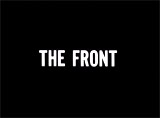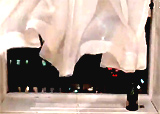
|
The Front (1976)
In director Martin Ritt's dark comedy, with the backdrop
of the Hollywood "Blacklisting Era" in the 1950s:
- the silent opening credits with stark white-on-black
titles
- the film's tagline: "What if there were a list?
A list that said: Our finest actors weren't allowed to act. Our
best writers weren't allowed to write. Our funniest comedians weren't
allowed to make us laugh. What would it be like if there were
such a list? It would be like America in 1953"
- the opening newsreel montage depicting the 1950's
to the tune of Frank Sinatra's "Young at Heart", intercut
with HUAC and McCarthy-era footage, including Senator Joe McCarthy's
wedding, bombing raids on Korea, and the use of a backyard air-raid
shelter
- the scene of blacklisted TV writer Alfred Miller (Michael
Murphy), over a game of chess, explaining to his longtime friend,
small-time bookie and NY deli clerk/cashier Howard Prince (Woody
Allen in his first serious film role), that he had been blacklisted: "Howard,
I can't work anymore...Blacklist...Howard, they won't buy my scripts.
I'm on a blacklist. Do you know what that means? It's a list of names.
The studios have 'em, the networks, the ad agencies. You're on the
list, you're marked, you don't work...I'm a Communist sympathizer...it's
not so popular anymore"
- the request of Alfred that he use Howard's name on
his scripts as a "front": "I need another name...Pseudonyms
don't work. They know we're all changing our names. I need a real
person now...someone they can believe and I can trust" - in
exchange for a 10% cut; now, Howard needed to pose as the scriptwriter
-
"they're gonna want to meet the writer..so you're gonna have to
go in there and really be the writer"
- the scene at the TV studio when Howard first met producer
Phil Sussman (Herschel Bernardi), and his idealistic production assistant
Florence Barrett (Andrea Marcovicci), who instantly was impressed
by his writing: "I really liked your script alot...Most of the
stuff I read, I mean, yours had substance. It was about people"
- the scene of an emergency in the middle of a dress
rehearsal, when Sussman demanded that Howard immediately rewrite
one of his scenes ("make it a firing squad" rather than
a gas chamber) in his script, and placed him in a bare office with
a typewriter; Howard protested to no avail: "I can't write except
in my room"
- the despairing character of unemployed and blacklisted
TV comedy actor Hecky Brown (Zero Mostel) who eventually committed
suicide by jumping from a hotel room window
- the ending in which Howard Prince testified before
the HUAC committee: "I don't recognize the right of this committee
to ask me these kind of questions. And furthermore, you can all go
f--k yourselves"
- the final sequence set at the train station, accompanied
again by Frank Sinatra's rendition of "Young at Heart" playing
on the soundtrack, when Howard kissed girlfriend Florence - revealing
he was handcuffed to an officer and surrounded by crowds waving signs
of support, as he boarded a train bound for federal prison
- the closing scene and credits (shown to the sounds
of Frank Sinatra's "Young at Heart") in which most of the
cast and crew (including the director) were accompanied by their
real-life dates of blacklisting
|

Blacklisted TV writer Alfred Miller (Michael Murphy) with
Howard

Howard with Florence at TV Studio

Howard In a Bare Office with Typewriter

Blacklisted Hecky Brown's Suicide From Hotel Window

Howard Prince: "You can all go f--k yourselves!"

Howard Kissing Florence

Ending Credits
|








